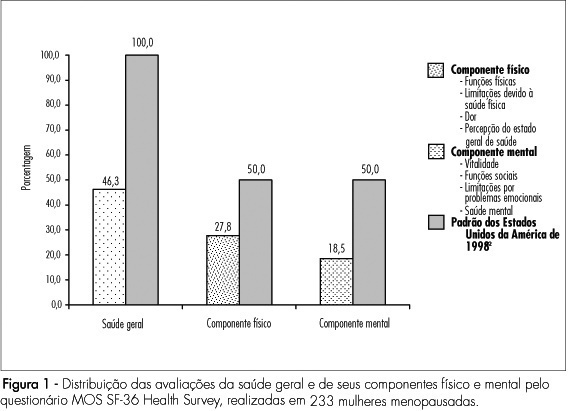Revista Brasileira de Ginecologia e Obstetrícia. 2008;30(3):113-120

PURPOSE: to evaluate quality of life of climacteric women attended at a school hospital in Recife, Pernambuco, Brazil, adopting the Medical Outcome Study 36-item Short Form Health Survey (MOS SF-36 Health Survey) and the Women’s Health Questionnaire (WHQ), as well as the modified Blatt-Kupperman index. METHODS: according to a descriptive, transversal study, 233 women, assisted from February to June 2006, were evaluated. Within a convenience sample, the inclusion criteria were age from 40 to 65 years old and agreement in participating of the research, excluding previous history of bilateral oophorectomy, hormonal therapy in the last semester and uncontrolled illnesses. The sample size was calculated admitting a prevalence of climacteric symptoms of 4% and a precision of 2.5%. The variables were: general health and physical and mental components based on the MOS SF-36 Health Survey; quality of health based on the WHQ and climacteric symptoms according to the modified Blatt-Kupperman index. Data were analyzed by the Statistical Package for Social Sciences, version 13.0 software. RESULTS: the quality of life was classified as bad. Based on the MOS SF-36 Health Survey, there was more damage in the mental component (18.53 versus 27.77% for physical components), higher losses in social functions (80.28%) and limitations for emotional problems (78.61%). According to WHQ, there were limitations due to sleep disturbances (69.77%), somatic (69.15%) and vasomotor symptoms (68.80%), considering regular sexual function and menstrual symptoms. Estrogenic deficiency symptoms were found in 53% of the women. The increase of hypoestrogenism symptoms were followed by worsening of general and menopausal health. CONCLUSIONS: it seemed reasonable to assume that menopause, for the researched women, was really configured as a biopsychosocial event, more than organic, derived predominantly from estrogenic deficiency.
Search
Search in:


Comments